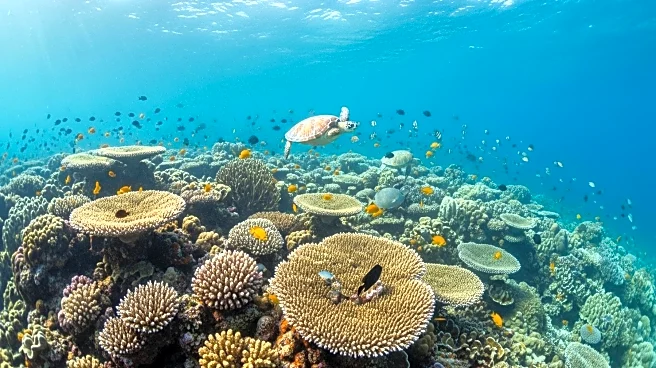What's Happening?
Coral reefs worldwide have reached a critical climate tipping point, according to a report by the Global Systems Institute at the University of Exeter. The report highlights that coral reefs are the first environmental system to pass this threshold, marking an unprecedented crisis. The tipping point is characterized by self-propelling changes that lead to significant and often irreversible consequences. The report, released ahead of the COP30 climate conference, emphasizes the urgent need for action as coral reefs, crucial for marine biodiversity and supporting the livelihoods of about a billion people, face severe degradation due to rising ocean temperatures. The report notes that coral reefs begin to die off when global warming reaches approximately 1.2 degrees Celsius, with 70-90% mortality at 1.5 degrees Celsius. This situation is exacerbated by mass bleaching events, where heat stress causes coral to expel algae, leading to weakened and pale coral structures.
Why It's Important?
The passing of the climate tipping point for coral reefs has significant implications for marine ecosystems and human communities reliant on these habitats. Coral reefs support a quarter of all marine species, and their decline threatens biodiversity and the economic stability of regions dependent on reef-related tourism and fishing. The report underscores the broader environmental risks, including potential tipping points for other systems like the Amazon rainforest and ocean currents. The degradation of coral reefs signals a need for immediate global action to reduce greenhouse gas emissions and transition to renewable energy sources. Failure to address these issues could lead to further environmental tipping points, with catastrophic consequences for global ecosystems and human societies.
What's Next?
The report calls for urgent action from global leaders at the upcoming COP30 climate conference to address the crisis facing coral reefs and other environmental systems nearing tipping points. It highlights the necessity of decarbonizing economies and reducing greenhouse gases to prevent further irreversible damage. The report also points to positive developments in renewable energy, such as the increased use of solar power and electric vehicles, as steps in the right direction. However, it stresses that more needs to be done to avert further environmental tipping points and mitigate their impacts.
Beyond the Headlines
The report suggests that the coral reef crisis could catalyze broader discussions on climate change and environmental sustainability. It highlights the ethical responsibility of global leaders to act decisively to protect vulnerable ecosystems and communities. The situation also raises questions about the long-term viability of current economic models reliant on fossil fuels and the need for systemic changes to ensure a sustainable future.











